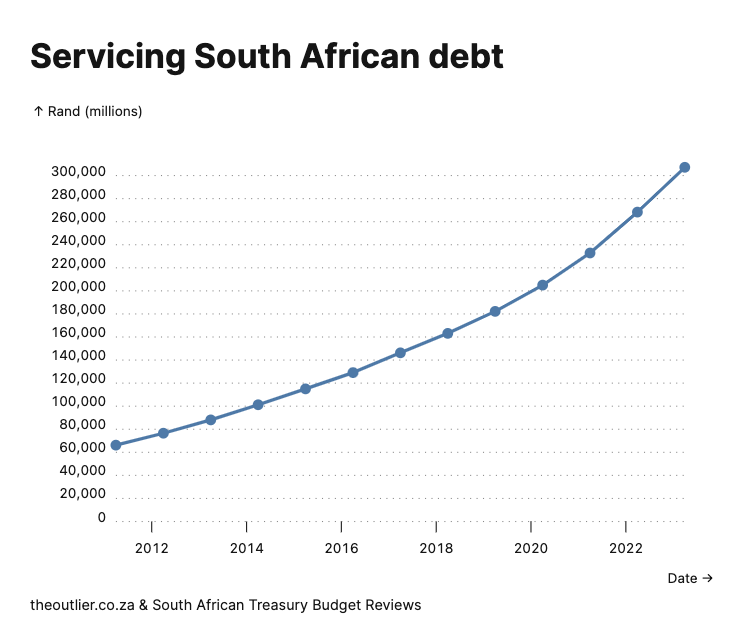BUSINESS REFLECTION
After the Bell: The Budget and the R150bn windfall

The SA Reserve Bank will fork out great gobs of dosh and put them in the pocket of the Treasury, or to put it another way, the taxpayer: R100bn this next year and two tranches of R25bn after that.
It’s so nice when the government agrees with you — not that one has any illusions about a direct correlation…
In December, I suggested the government should go ahead and grab some of the Gold and Foreign Exchange Contingency Reserve Account (GFECRA) cash.
To be clear, I wasn’t alone. Most left-wing economists were vociferously in favour of the idea. But then, you know, they are generally in favour of any measure which increases the government’s ability to spend. Their approach to budgeting is similar to my approach to bacon: more!
Interestingly, most of the centrist economists were generally non-committal and I think that gave the Treasury confidence that it could go ahead without too much heat from the markets.
The issue of GFECRA sounds technical, but actually it’s very simple. The SA Reserve Bank runs a large reserve in foreign currency markets because the bank doesn’t want to be caught short if there is a sudden demand for foreign currency. If that were to happen, the rand, which already bounces around like crazy, would be even more volatile. So it’s just a method of reducing volatility risk.
This volatility became very apparent during the 1998 emerging markets crisis when there was a large and very sudden movement against the rand. At the time, the Reserve Bank tried to support the rand, a poor decision, as it turned out. The problem was not so much the choice to defend the rand but to defend the rand with so little ammunition in the pouch. As they say, only an idiot takes a knife to a gunfight.
The result was that in 2003, the SA Reserve Bank went, cap in hand one presumes, to the then finance minister Trevor Manuel and asked him — or to put it another way, the taxpayer — to square the account. The then government swallowed its pride and did so, handing over R28-billion.
So, since then, the Reserve Bank has gradually built up the reserve in part, surely, because it didn’t want to do that again. As the rand has declined in value, this reserve has grown larger and stands today at around R500-billion. In 2012, it was only R65-billion. That’s an amazing achievement, or perhaps we could say an amazing fluke. If you were a currency dealer and you turned a R65-billion fund into a R500-billion fund in a decade, you would be nipping down to the Sandton Ferrari dealership quite often.
What the Treasury and the bank have decided to do is “settle a portion of the valuation gains, after ensuring that the necessary buffer and contingency reserve are fully funded”. Don’t you love the way this is phrased: a portion is going to be “settled”, because it was so “unsettled” before; in a sense, you could say it was positively unruly, anarchic even, rebellious and mutinous! But thankfully, it’s all now “settled”.
And what “settlement” means, in my language at least, is that the Reserve Bank will fork out great gobs of dosh and put them in the pocket of the Treasury, or to put it another way, the taxpayer: R100-billion this next year, and two tranches of R25-billion after that.
The Budget Review gives us a little more detail on the state of the GFECRA, pointing out that the bank had to use the buffer during Covid, of course, which shrank the fund by around R100-billion. So if even Covid could not make more of a dent in the GFECRA, the rand is presumably pretty safe for the time being.
So, what will the government do with the cash? It’s simple: just reduce debt. The government’s debt requirements are now so huge that the reduction doesn’t make as big a difference as you might think. But it does mean that debt will peak at 73% of GDP, not 77%, in 2025/26, according to current calculations — if you believe the projections (I don’t).

The cost in millions of rands to service South Africa’s debt which was incurred because of a shortfall in the government’s revenue and its planned spending. (Treasury Budget Reviews via Outlier Insights)
Presumably, the Reserve Bank likes that idea because any reduction in government debt makes it less likely that it might have to use the contingency reserve. So there was a sensible meeting of minds here. In this sense, I wrongly encouraged the government to use the GFECRA for infrastructure spending.
This captures my feelings about this budget and so many others: there is a lot of fancy footwork going on to keep the numbers balanced and everything under control. But it is transparently keeping the lid on a boiling pot. And it doesn’t disguise the fundamental problem: South Africa needs to find some economic growth. It needs to find a lot of economic growth.
There was too little thinking about that topic in this budget and many others before it. What is missing here is a real growth strategy. Obvs. DM




















 Become an Insider
Become an Insider
Must be the first time I disagree with you Tim. There are phrases that deep down you’re also not entirely convinced.
I’m no money man (can’t really do maths but am cautious with money and oddly successful…) but I don’t buy the spin.
This forex fund hiding safely away in plain sight did us a lot of good. It is our only safe guard against currency and international fluctuations – and everyone was aware of it. It made us trustworthy and lent us credibility in financial capitals.
Now that the dyke has been pricked, monetizing a whopping R150-bln of R500-bln, the fund has instantaneously lost its sacrosanct bastion of stability.
Using this fund to stabilise finances during a pandemic is exactly what its purpose is; but to sort out Cashflow after maxing out all one’s credit cards on unsustainable consumption is not.
SARB and Treasury were not the adults in the room.
I fear the fund will be depleted in a few years, not only because politicians also can’t do maths, but because spending money is their day job for the five years they MPs. They don’t care what disaster awaits in the future.
But we have to. And a ring-fenced fund will help us. This is now under threat.
It seems like the ANC is basically printing money out of thin air.
I agree with pet bug. While the GFECRA maybe an important back stop its origins are hardly praiseworthy.
After all, the forex value of a country’s currency is essentially the price that the international community thinks a country is worth.
So here we have a situation where the managers of a country have managed it so badly that its price has consistently fallen for the last 20 years.
Now, instead of trying to effectively change management behaviour so as to start increasing the value of the currency, all that is happening is a licking of lips before diving into the trough.
If this all that is going to happen then the logic seems to be to behave even worse so that Rand declines even quicker and there will be more funds in the GFECRA for more bail outs.
It will be useful if Tim and other insightful share what the ultimate conclusion of this madness will be, instead of what seems to be carefully avoiding thinking about L/T consequences so as not to appear like S/T party poopers!
The two comments have a good point but it should also be remembered that we (the tax paying public) were required to help recapitalise GFECRA after the EM crisis. It can’t – or doesn’t have to – be a one-way street. Of course, if things go off the rails there already isn’t enough tax in the near term for us to recapitalise again. I’d say that money is not very different from our taxes: what matters is who spends it and how; not so much that it is spent or left untouched.
To be honest, this isn’t really a good sign. Full stop. We are essentially buying time through this exercise. Final full stop.
They could have spent it on a sovereign wealth fund which only invests outside of SA! We need revenue
If we compare government action in this matter with a private household, it looks like this: I have a current account into which my monthly salary payments are received (tax income) and from which I pay my current expenses (essential, unimportant and gifts). In addition, I have a savings account with an iron reserve (GFECRA). If I constantly spend more than I earn, I overdraw my checking account until the bank gives me problems. I can then raid my savings account to give myself some breathing room. Then I only have two legal options. My employer needs to generously increase my salary, which he will probably refuse to do. Ultimately, I have no choice but to change my lifestyle. Even if I use my savings for just one investment (new furniture, new car), it won’t solve my core problem. To realize this, you don’t need a degree in economics or even basic accounting knowledge, just a little common sense.